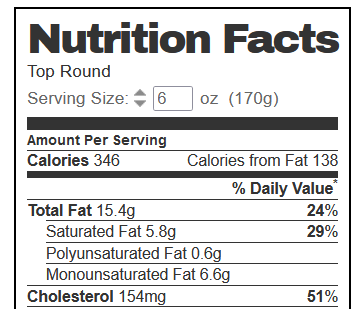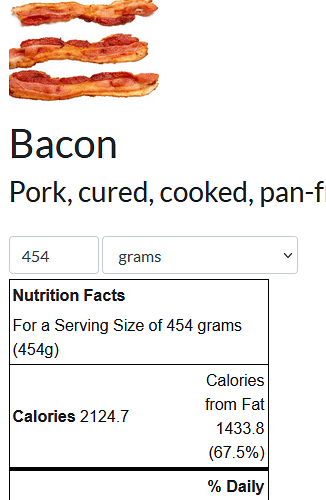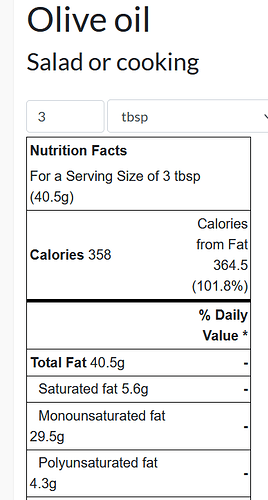I realize it’s relative, but to what? It’s really just a way for vegans and vegetarians to denigrate meat, as meat is “high” in saturated fat.
And I specifically tried to eat a “high” saturated fat diet, while trying the croissant diet. After I stopped eating carbs+sat fat, I tried a low carb sat fat diet. But to eat a high sat fat diet, you have to eat:
- beef suet
- cacao butter
- certain dairy
Other than this, nothing is high in saturated fat. (Coconut is high in saturated fat, but it’s mainly short-chain fatty acids, which according to Hyperlipid won’t cause a satiety effect.)
Now, those are actually high in saturated fat.
But this leads to comparisons like this one:
3Tbsp olive oil (easy to eat on a salad):
6 ounces of top round:

Which one is “high” saturated fat?
Granted, meat is higher – percentage wise – then olive oil, but this simple example shows one can get the SAME EXACT amount of saturated fat eating both.
To me, this renders statements like “meat is high in saturated fat” to be meaningless.
Also, Dave was speaking about how he could tailor his lipids based on what he ate. But in terms of saturated fat, that’s really hard to do.
Consider the example I showed above. There’s no difference in saturated fat.
Whenever you eat real food, you’re going to have a wide variety of fats. Even if you went “zero” fat (say, the Pritikin diet I was on for years, where I ate hot cereal, pasta, brown rice + beans, rice cakes, egg whites, chicken breasts, etc.) then went to an all meat diet, are you now eating a “high” saturated fat diet? No, you’re not. You’re eating a high MUFA diet.
Say you test your lipids and LDL (or whatever) changed. What caused that? The “high” saturated fat? It’s impossible to tell.
Every time I see a statement like “high saturated fat causes LDL to increase”, 99.99999999999 % of the time, there are too many variables involved to ascertain what caused the change.
As a scientist, I cannot abide by these types of generic statements that really have no meaning.
As for FFAs and the heart, I have an interest in everything related to the heart since I was diagnosed with cardiomyopathy 8+ years ago.
There are many studies indicating that ketones are preferred by the failing heart (just don’t ask your cardiologist whether you should go on a “high” saturated fat diet by eating all meat…). But someone like me has very low ketones, so something else must be making up for that.
Unfortunately, the studies of FFAs in heart failure are conflicting, and none of them study me…someone low carb/keto for almost 8 years and with heart failure.
In fact, no one studies those of us low carb/keto for this long.



